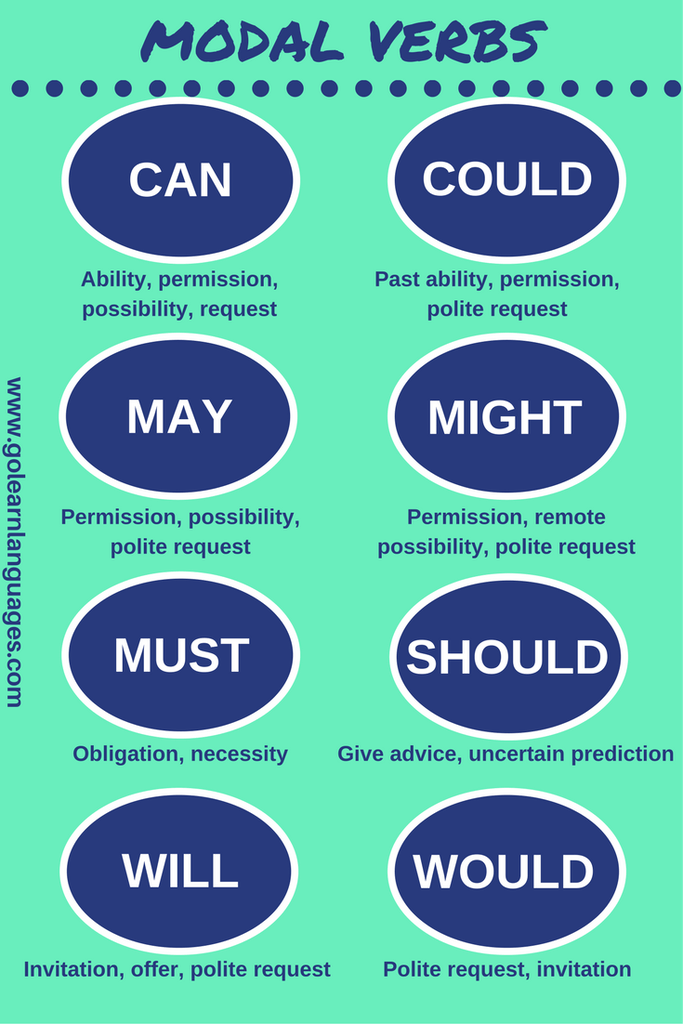Modal Verbs | Examples are permission, obligation, lack of necessity, possibility, ability, prohibition, advice and probability. Modality is the grammaticalized expression of the. These are verbs that indicate likelihood, ability, permission or obligation. Possibility, prediction, speculation, deduction and necessity. Likelihood, ability, permission, request, capacity, suggestions, order, obligation, or advice.
Modals can nuance the meaning of the principal verb in a number of ways:. Likelihood, ability, permission, request, capacity, suggestions, order, obligation, or advice. Uses of the modal verbs in english. Most people will see the word verb and think doing words because verbs are. Also , a modal verb can express ability, necessity, conditional, probability, possibility, or prohibition.

First, in the exercise on the left, choose the correct modal verb in the present tense, in order to construct a text that makes sense. The modal verbs of english are a small class of auxiliary verbs used mostly to express modality (properties such as possibility, obligation, etc.). They can also be used to form the future tense in english and to make conditional sentences. Jul 24, 2021 · modal verbs are a type of auxiliary verb that express modality in the english language. Modal verbs are helping/auxiliary verbs that express ideas like ability, permission, possibility, and necessity. Examples are permission, obligation, lack of necessity, possibility, ability, prohibition, advice and probability. Uses of the modal verbs in english. These are verbs that indicate likelihood, ability, permission or obligation. Modality is the grammaticalized expression of the subjective attitudes and opinions of the speaker including possibility, probability, necessity, obligation, permissibility, ability, desire, and contingency. Modal verbs always accompany the base (infinitive) form of another verb having semantic content. Each one of the modal verbs can be used to express one or more of these modalities. Modal verbs are auxiliary verbs which can't function as main verbs. In english, the modal verbs are used to express ability, possibility, permission or obligation.
You may already know that they can express ability, permission, possibility,. Uses of the modal verbs in english. Modality is the grammaticalized expression of the. Modal verbs are a type of auxiliary verb which express the mood of another verb. Examples are permission, obligation, lack of necessity, possibility, ability, prohibition, advice and probability.

Jul 24, 2021 · modal verbs are a type of auxiliary verb that express modality in the english language. Modal verbs are common auxiliary verbs in germanic languages including english that indicate modality. Must in the last sentence is an example of a modal verb. Examples are permission, obligation, lack of necessity, possibility, ability, prohibition, advice and probability. Modal verbs are a type of auxiliary verb which express the mood of another verb. Modal verbs are used in conjunction with verbs to express their function. Jun 01, 2009 · modal grammar. Modal verbs are special verbs in the english language. Modality is about a speaker's or a writer's attitude towards the world. The negative or interrogative form of a. Modal verbs have the following characteristics: Can/could, may/might, will/would, shall/should and must. Modal verbs are auxiliary verbs which can't function as main verbs.
You may already know that they can express ability, permission, possibility,. Modal verbs always accompany the base (infinitive) form of another verb having semantic content. Also , a modal verb can express ability, necessity, conditional, probability, possibility, or prohibition. Jun 01, 2009 · modal grammar. You must remember that modal verbs are followed by an infinitive but without the word "to".

Can/could, may/might, will/would, shall/should and must. Jun 01, 2009 · modal grammar. Modal verbs always accompany the base (infinitive) form of another verb having semantic content. Modal verbs are helping/auxiliary verbs that express ideas like ability, permission, possibility, and necessity. They can also be used to form the future tense in english and to make conditional sentences. Must in the last sentence is an example of a modal verb. You must remember that modal verbs are followed by an infinitive but without the word "to". You may already know that they can express ability, permission, possibility,. Modality is about a speaker's or a writer's attitude towards the world. They are used to express ideas such as: Modality is the grammaticalized expression of the subjective attitudes and opinions of the speaker including possibility, probability, necessity, obligation, permissibility, ability, desire, and contingency. Most people will see the word verb and think doing words because verbs are. Many modal verbs have more than one meaning.
Modal Verbs: Uses of the modal verbs in english.

Post a Comment